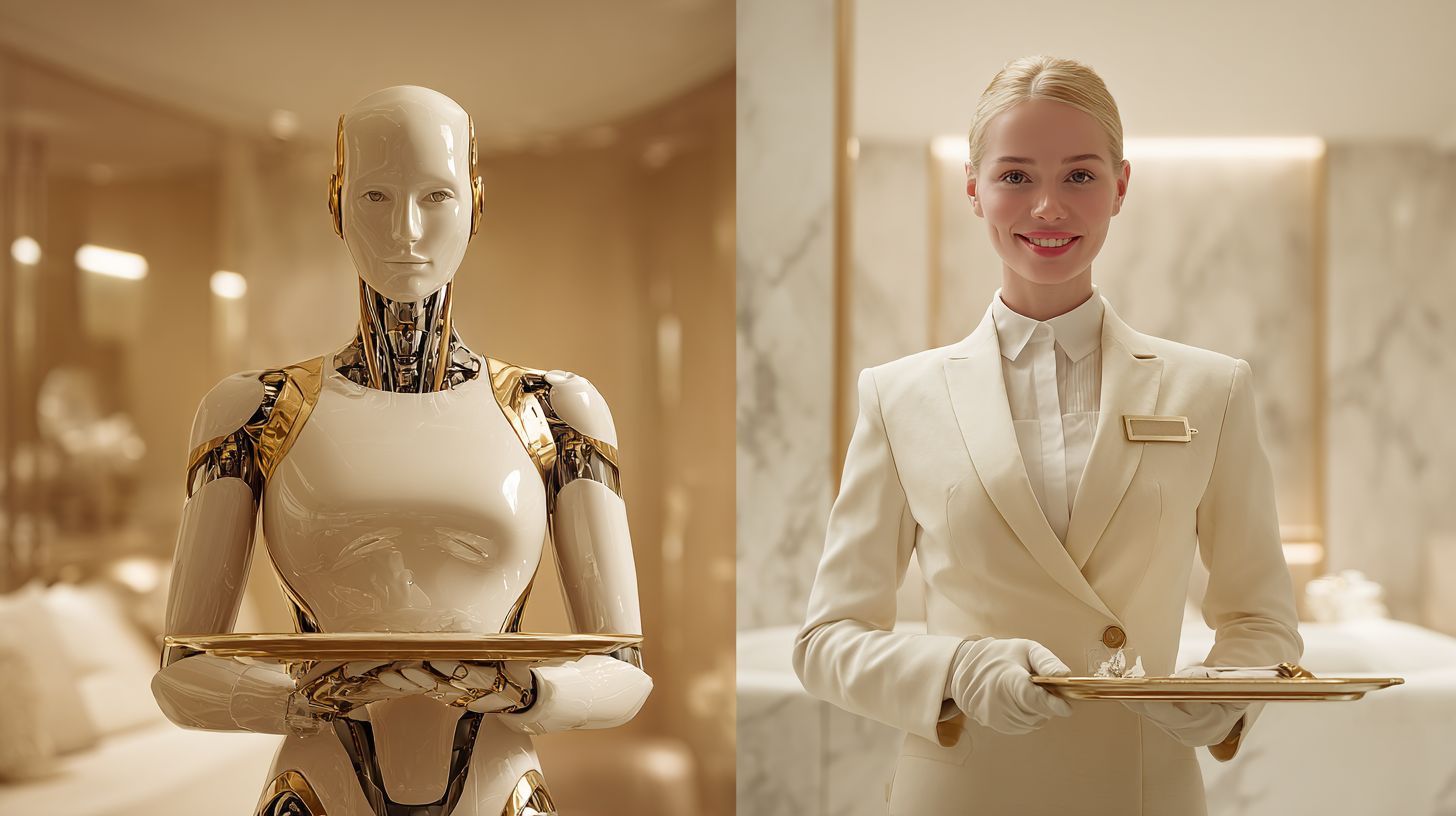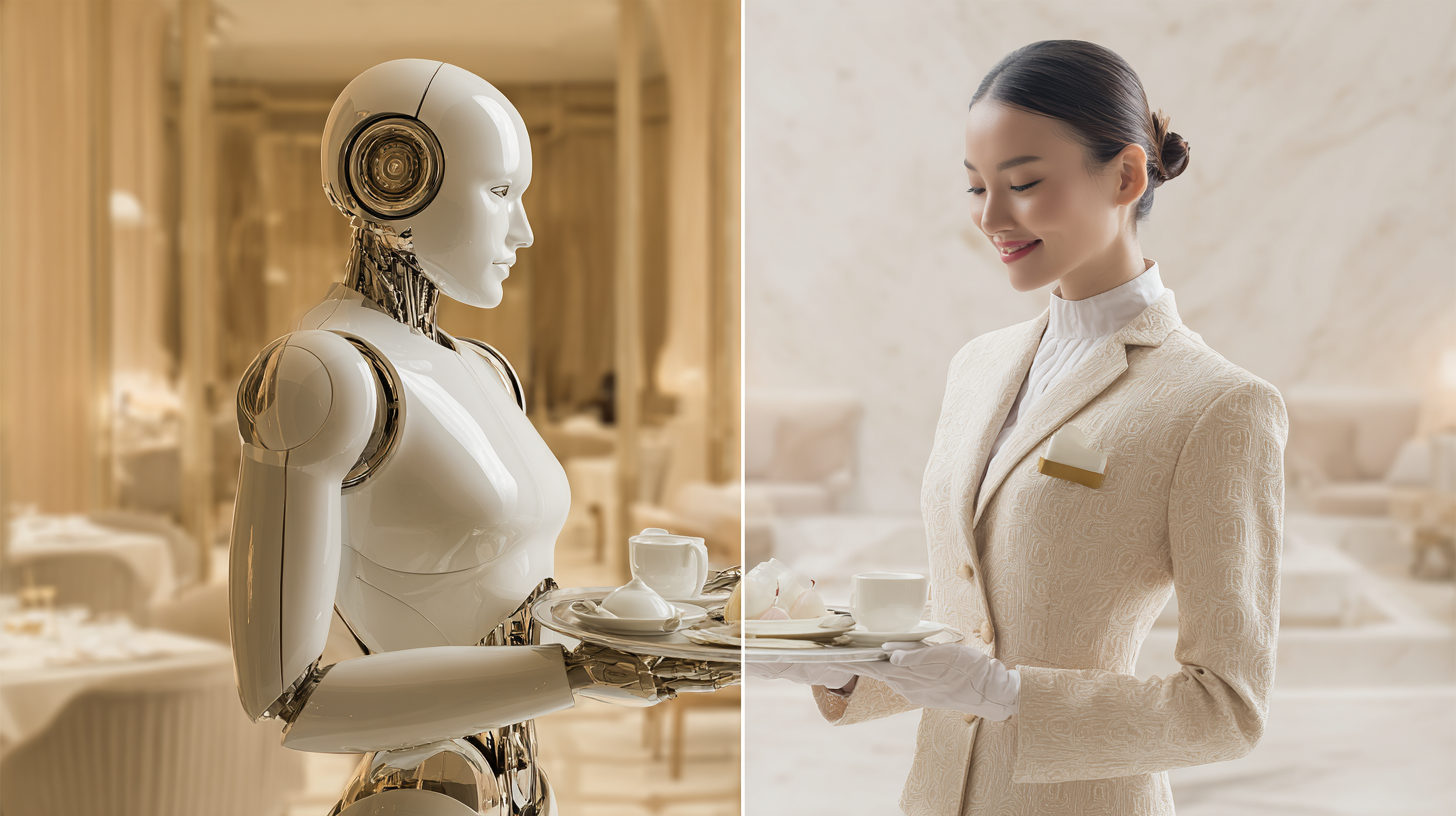The post-IA era:
A world where people are the real luxury
Artificial intelligence continues to progress. Some AIs are already achieving impressive performance in analytical or logistical tasks. But when faced with a distressed customer, an emotional contingency or a subtle intercultural interaction, the machine remains mute. It’s the human qualities that make all the difference.
This reality becomes even more evident in multicultural contexts, where the finesse of human interaction, the management of implicit expectations and adaptation to diverse behavioral norms play a key role. In these cases, only human emotional intelligence, trained in relational excellence, can make the difference.

Human skills: the ultimate competitive advantage
- Emotional intelligence and a sense of timing
A study by TalentSmart (2022) reveals that people with a high emotional quotient earn up to $29,000 more per year than those with a low EQ. In hospitality, knowing how to capture an emotion, grasp the unspoken or create a warm atmosphere makes all the difference: it’s often what turns a simple interaction into a memorable experience.
This skill goes far beyond interpersonal relations: it influences team dynamics, customer loyalty and even strategic decision-making. In a world saturated with data, the ability to sense, interpret and adjust in real time is becoming a rare and precious resource.
- Critical thinking and real-time resolution
The World Economic Forum lists critical thinking and problem-solving as one of the 5 essential skills for 2027. In an environment where novel situations are frequent, knowing how to analyze, invent a suitable solution and act quickly is essential in areas where AI follows without really understanding.
In an environment where customer expectations are rapidly evolving, these skills enable professionals to deal with unprecedented situations with flexibility and ingenuity. Critical thinking thus becomes a lever for innovation and resilience.
- Leadership in a VUCA world
Today’s business environment is characterized as VUCA: Volatile, Uncertain, Complex and Ambiguous. It demands situational intelligence, the ability to interpret the unforeseen, to reassure in the unknown. Qualities that only humans can fully master.
In such an environment, the most effective leaders are those who can combine strategic vision with empathy, inspiring trust while navigating the gray areas with courage and discernment.
The human in action: two examples impossible to automate
- Example 1
A lonely elderly guest staying in a long-term care hotel becomes agitated and withdrawn.
A member of the housekeeping team engages in a gentle, informal discussion. She discovers that this guest suffers from extreme loneliness. Thanks to a simple gesture – a personalized card and an invitation to a social activity – the mood changes. The customer’s serenity is restored. No algorithm would have perceived or solved this. - Example 2
At an international conference, a speaker loses his suitcase with his presentation documents, stressed and angry.
The receptionist doesn’t just “follow procedure”: he contacts the airport, prints a backup PDF version from the cloud, has an ironed shirt and a strong coffee delivered in ten minutes. This isn’t service – it’s emotional anticipation. Human intelligence.

Hospitality as a school of human skills
At the École Hôtelière de Genève, students learn by doing how to react to the unexpected, collaborate across cultures, manage emotions and show initiative with tact and elegance. These skills are applied far beyond the industry: in luxury goods, consulting, services, diplomacy and interpersonal skills.
Hotel education goes far beyond simple operational management: it shapes professionals capable of acting with accuracy, discernment and human warmth in complex contexts. Profiles that are becoming essential in all areas of the future.
Key figures:
- +$29,000 in additional annual income linked to high QE(TalentSmart, 2022)
- 39% of professional skills will be renewed or become obsolete by 2030 (WEF Future of Jobs Report 2025)
- 60% of recruiters say that soft skills are now more important than technical skills(HR Dive, June 2025)
It's not technology that will define tomorrow's leaders, but their ability to remain deeply human, in all their interactions.
In a technological world, what sets a professional apart is his or her ability to welcome, reassure, adjust and embody. This is what hotel education is all about. It makes talent relevant, adaptable and irreplaceable.

